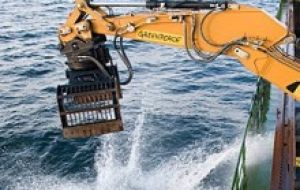MercoPress. South Atlantic News Agency
Greenpeace dumps boulders in North Sea to prevent trawling
 Granite rocks are dropped by the Beluga II in the North Sea
Granite rocks are dropped by the Beluga II in the North Sea Greenpeace has sailed into a mini-storm of annoyed marine biologists after dropping massive granite boulders into the North Sea in an attempt to disrupt fishing. Last week the ship the Beluga II began dropping the first of 150 granite rocks weighing 2 to 3 tonnes onto the seabed.
"By strategically placing granite rocks, Greenpeace intends to protect this ecologically diverse area from destructive practices including bottom trawling" said the group adding that the aim is to stop fishing in an area which on paper is protected under European law. "The Sylt Outer Reef is home to an abundance of sea life and is a popular fishing ground. Although the reef is designated as a 'Special Area of Conservation' by the EU, highly destructive fishing practices such as bottom trawling and sand and gravel extraction are permitted. This is decimating the marine life that inhabits the area, including well known fish species such as plaice and sole, and destroying the reef", insisted Greenpeace. Unsurprisingly fishermen were not happy and more surprisingly some marine biologists have joined them in condemning the group. Conservationist Mark Powell was one of the first to tackle the issue of what has become known as "eco-sabotage". "I don't like eco-sabotage, it tends to polarize issues and turn off people who might otherwise support conservation. I doubt this action will be effective in stopping fishing, and if it does work it is equivalent to taking the law into one's own hands, which is a very slippery slope leading towards very bad things", warned Powell. "I've done a lot of ocean bottom research, and I don't believe that Greenpeace can be sure no harm was done. It's impossible to map the ocean bottom so precisely and dump huge blocks so carefully as to avoid all damage. Even if nothing was crushed, this action replaces natural habitats with artificial habitats", he added. However Greenpeace Germany oceans campaigner Dr Iris Menn argued that "the fishing industry is not only pushing many fish species to the point of collapse, but also their own future. If they carry on emptying the oceans of sea life then very soon there will be nothing left for them to fish". "We need the Sylt Outer Reef to truly be protected, and not just on paper. That means an enforceable ban on fishing and sand and gravel extraction in the area to create an effective marine reserve. Only this will give the area a chance to recover after decades of exploitation". Greenpeace is calling on the German government to press the European Commission to implement new measures which will prohibit fishing in the area by the beginning of next year at the latest, and is calling on the Netherlands, Denmark and the UK to support this. Greenpeace is also demanding that the latter also takes steps to complete its own network of marine reserves. Dr. Menn went on to justify the dumping of rocks, "if the German government is not going to honor its commitments and give the Sylt Outer Reef the protection it so badly needs, then it is up to Greenpeace to act. By placing these rocky obstacles to stop trawling in the area, we are sending a clear message which is that business as usual cannot continue".




Top Comments
Disclaimer & comment rulesCommenting for this story is now closed.
If you have a Facebook account, become a fan and comment on our Facebook Page!